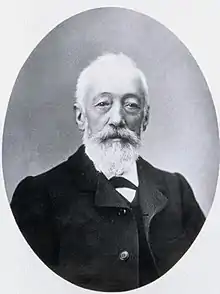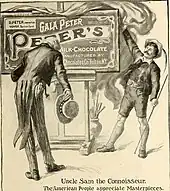Daniel Peter
Daniel Peter (9 March 1836 – 4 November 1919) was a Swiss chocolatier and entrepreneur who founded Peter's Chocolate. A neighbour of Henri Nestlé in Vevey,[1] he was one of the first chocolatiers to make milk chocolate and is credited for inventing it,[1][2][3] in 1875 or 1876, by adding powdered milk to the chocolate.[4][5]
Daniel Peter | |
|---|---|
 | |
| Born | 9 March 1836 |
| Died | 4 November 1919 (aged 83) Vevey, Switzerland |
| Nationality | Swiss |
| Occupation | Chocolatier |
| Known for | Creator of milk chocolate and founder of Peter's Chocolate |
| Relatives | François-Louis Cailler (father-in-law) |
Life
Peter was born on 9 March 1836 in Moudon, in the canton of Vaud, to Jean Samuel Peter, a butcher, and Jeanne-Louise Laurent,[6] in a family of Alsatian origin.[7] He began his commercial apprenticeship in Vevey, where in 1856 he established the candle-making business Frères Peter, but soon he diversified his business to include chocolate fabrication,[6] as demand for his candles fell, owing to the introduction of affordable kerosene lamps. He married in 1863 to Fanny-Louise Cailler, a daughter of François-Louis Cailler, also a chocolatier.[6]

When Peter came up with the process of making milk chocolate in 1857, he had a problem with removing the water from the milk, which caused mildew to form. It was not until he enlisted the cooperation of Henri Nestlé, then a baby-food manufacturer who had invented a milk-condensation process, that finally, in 1875, after seven years of effort, he was able to bring the product onto the market. However, it is only after many years of fine-tuning that the original formula was developed and, in 1887, the Gala Peter brand was finally launched. Daniel Peter called his product 'Gala' after the Greek word meaning 'milk'.[8] From these developments, Switzerland soon dominated the chocolate market. Earlier, in 1896, Daniel Peter wrote:
I believe I know with some certainty that almost all manufacturers in Switzerland, if not all, have tried to copy me. It is proof of the value they attribute to my creation, and all of them, after unsuccessful attempts, have had to give it up, and I do not know, at the present time, any competition for my product[9]
Daniel Peter also launched the Delta Peter brand, which consisted of milk and cocoa powder that could be added to water to make a chocolate drink. Peter used a triangular packaging, with each individual triangle of pressed powder to be used for one cup.[10]
Earlier, in 1879, Daniel Peter and Henri Nestlé formed a partnership that organised the Nestlé Company, eventually one of the largest of Europe-based confection industries, into existence. In 1904, he eventually merged with the Kohler company. All Peter, Cailler and Kohler brands were bought by Nestlé in 1929.
Daniel Peter died on 4 November 1919 in Vevey.
References
- Thomas Stephens (13 December 2017). "The pioneers of Switzerland's 'Chocolate Revolution'". Swissinfo. Retrieved 7 April 2021.
- "History of Chocolate". History. 21 August 2018. 14 December 2017. Retrieved 7 April 2021.
- Heer, Jean (1991). Nestlé: 125 Years, 1866-1991. p. 55.
- "Toms: Chokoladens historie" [Peter Daniel from Nestlé in Switzerland invents further by adding milk powder to chocolate, thereby producing the first milk chocolate in 1875.] (in Danish). Archived from the original on 15 April 2015.
Peter Daniel fra Nestlé i Schweiz opfinder videre ved at tilføre mælkepulver i chokolade, og laver dermed den første mælkechokolade i 1875.
- "Cocoa", Encyclopædia Britannica. Encyclopædia Britannica Online Academic Edition. Encyclopædia Britannica Inc., 2013. Web. 9 May. 2013.
- Marion, Gilbert. "Peter, Daniel". Historical Dictionary of Switzerland (in French). Retrieved 7 April 2021.
- Encyclopédie illustrée du pays de Vaud: Les artisans de la praspérité (in French). 24 heures. 1972. p. 142.
- Sloane, Paul (21 September 2016). "Daniel Peter". Think Like An Innovator. ISBN 9781292142258. Retrieved 11 April 2021.
In 1887, after many unsuccessful experiments, Daniel Peter developed the original formula for what was to become the first successul milk chocolate in the world. He called his product Gala after the Greek word meaning 'from the milk'
- Heer, Jean (1966). Reflets du monde 1866-1966: présence de Nestlé. p. 85.
Je crois savoir d'une manière à peu près certaine que presque tous les fabricants de Suisse, sinon tous, ont tenté de me copier. C'est une preuve de la valeur qu'ils attribuent à ma création, et tous, après des essais infructueux, ont dû y renoncer, et je ne connais, à l'heure actuelle, aucune concurrence à mon produit, si ce n'est le chocolat au lait en pâte de l'Anglo-Swiss Condensed Milk Co. à Cham, espèce de confiture au cacao dont la conservation est limitée et qui ne répond absolument pas aux mêmes besoins.
[I believe I know with some certainty that almost all manufacturers in Switzerland, if not all, have tried to copy me. It is proof of the value they attribute to my creation, and all of them, after unsuccessful attempts, have had to give it up, and I do not know, at the present time, any competition for my product, excepting the milk chocolate paste from the Anglo-Swiss Condensed Milk Co. in Cham, a kind of cocoa jam whose shelf life is limited and which absolutely does not meet the same needs.] - Gilomen, Hans-Jörg (2001). Innovationen: Voraussetzungen und Folgen, Antriebskräfte und Widerstände. Chronos. p. 146. ISBN 9783034005180.
Vermutlich seit Beginn der 1890er Jahre wurde die Milchschokolade auch in kleinen, dreieckigen Portionen in gepresster Pulverform und einer dreieckigen Verpackung unter dem Namen « Delta Peter » verkauft – ein Vorläufer der 1908 von Theodor Tobler auf den Markt gebrachten Toblerone!
[Presumably since the beginning of the 1890s, milk chocolate was also sold in small, triangular portions in pressed powder form and a triangular packaging under the name "Delta Peter" – a forerunner of the Toblerone launched by Theodor Tobler in 1908!]
{{food- -stub}}